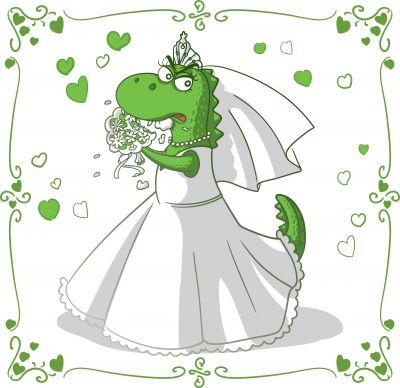 You’ve probably heard the terms “bridezilla” or “groomzilla” by now, both used to describe people who become obsessive and demanding during the wedding planning process. While the derogatory moniker is mostly slung at women, men aren’t escaping the label as grooms step up to assume more wedding planning responsibilities or take over the whole process themselves. At this point, you might even be a little worried about turning into a “zilla” yourself. However, it’s important to break down the stereotype, understand its possible origins, and follow some worthy advice to avoid excess stress before you walk down the aisle.
You’ve probably heard the terms “bridezilla” or “groomzilla” by now, both used to describe people who become obsessive and demanding during the wedding planning process. While the derogatory moniker is mostly slung at women, men aren’t escaping the label as grooms step up to assume more wedding planning responsibilities or take over the whole process themselves. At this point, you might even be a little worried about turning into a “zilla” yourself. However, it’s important to break down the stereotype, understand its possible origins, and follow some worthy advice to avoid excess stress before you walk down the aisle.
A Brief History of the Word “Bridezilla”
Merriam-Webster gives readers an inside peek at the origins of the word “bridezilla.” The lexiconic authority states that the term originated around 1995 as a portmanteau of “bride” and “Godzilla,” the latter derived from the famous giant lizard first appearing in Ishiro Honda’s 1954 eponymous film. The television show “Bridezillas” may have further boosted the concept’s visibility into broader popular culture as it presented weekly examples of over-the-top meltdowns, shocking behavior, and aggressive bullying. Snopes writer Barbara Mikkelson also documented a few outrageous bridezilla stories circulating the internet in the early 2000s. Additionally, grooms regarded as overly enthusiastic, pedantic, or controlling during their planning activities also found themselves slapped with the “groomzilla” label.
Are Gendered Expectations to Blame?
As many thinkers point out, women in heterosexual relationships are usually expected to take the lead in wedding planning. New York Times writer Kelsey McKinney explains how this sexist notion places all the responsibility on women and loads them down with expectations that the resulting event will be flawlessly executed. McKinney also proposes that it can shame women out of becoming assertive and strongly expressing their preferences. Furthermore, she cities Rebecca Mead’s 2007 book “One Perfect Day” and wonders if wedding vendors take advantage of emotional chaos in hopes that brides-to-be will “spend any amount of money to get what they want.”
Not only that, the “zilla” stereotype can disadvantage other genders. In a 2015 GQ article, writer Zach Baron described his observation of how wedding vendors “gender profile” and expect brides to make the major decisions. Social norms rooted in toxic masculinity may have classified wedding planning as “women’s work” and discouraged men from participating, but a 2017 MEL Magazine write-up reveals that individuals such as author Rick Webb are working to turn this tide. Webb’s book “Man Up: A Groom’s Guide to Heroic Wedding Planning” challenges straight men to help plan and gives advice about every part of the process. Meanwhile, the stereotype’s heteronormativity can also penalize queer and transgender people perceived to act outside customary gender norms while completely ignoring nonbinary individuals.
Reframe the “Zilla” Notion and Destress
Huffington Post contributor Rev. Laurie Sue Brockway suggests that there’s often more than meets the eye when someone is called a “zilla,” referring to emotional breakdowns, exhaustion, and pressures placed upon the soon-to-be-wed by vendors as well as friends and families. Brockway also recommends some advice for stressed-out planners:
- Identify underlying issues that are causing your worries.
- Put yours and your partner’s priorities first.
- Resist the urge to view your wedding as an indicator of a successful marriage.
- Don’t overlook needed emotional and spiritual support.
Perfectionism, outside pressures, and gendered expectations can quickly turn the wedding planning process from joyful to agonizing, potentially turning nearlyweds into “zillas.” It’s important to remember that while your nuptials are just one day out of many, your marriage is intended to last. You can sidestep stressors by staying tuned into reality, taking breaks from planning, relying on moral support, and focusing only on what you and your mate want.
Add Your Comment